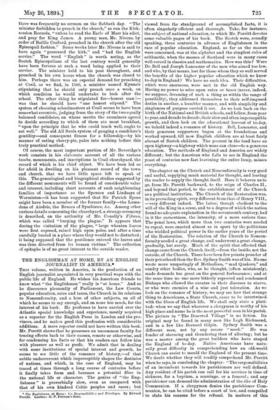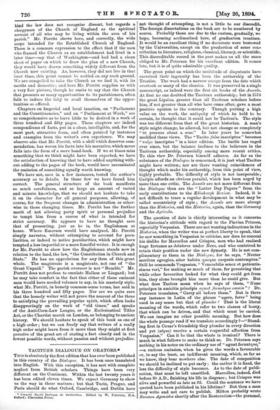THE ENGLISHMAN AT HOME, BY AN ENGLISH JOURNALIST IN AMERICA.*
THIS volume, written in America, is the production of an English journalist acquainted in very practical ways with the public life of England. He wishes his American friends to know what "the Englishman" really is "at home." And 80 he discourses pleasantly of Parliament, the Law Courts, popular education, rates and taxes, the Church in its relations to Nonconformity, and a host of other subjects, on all of which he seems to say enough, and on none too much, for the interest of his book. He professes to have carried over the Atlantic special knowledge and experience, mostly acquired as a reporter for the English Press in London and the pro- vinces, and he makes good this profession with considerable additions. A mere reporter could not have written this book. Mr. Porritt shows that he possesses an uncommon faculty for tracing effects back to their causes, remote or otherwise, and for condensing his facts so that his readers can follow him with pleasure as well as profit. We admit that in dealing with some institutions of special interest and growth, he seems to see little of the romance of history,—of that subtle undercurrent which imperceptibly shapes the destinies of nations, and which, in the case of England, may be traced at times through a long course of centuries before it finally takes form and becomes a potential fibre in the national life or character. The genius of "the Eng- lishman" is proverbially slow, even as compared with that of his own kindred Celtic peoples and races ; but • The Englishman at Home: his Responsailiti:s and Priviteges. By Edward Porritt. London: G. P. Putnam's Sons.
viewed from the standground of accomplished facts, it is often singularly efficient and thorough. Take, for instance, the subject of national education, to which Mr. Porritt devotes some valuable pages of his book. The Scotch were, roundly speaking, three centuries in advance of Englishmen in the race of popular education. England, so far as the masses were concerned, was at the alphabet and the simplest rules of arithmetic, when the masses of Scotland were in many cases well-versed in classics and mathematics. How was this ? Were Dr. Bell and Joseph Lancaster of the men who aimed too low, and who, by that means, lost for those whom they so well served the benefits of the higher popular education which we know to-day in England ? We have no such idea. Their difficulties, which were enormous, were met in the old English way. Having no power to seize upon rates or taxes (never, indeed, we suppose, dreaming of such a thing as within the range of possibility), they addressed themselves to their self-imposed duties in another, a humbler manner, and with simplicity and singleness of purpose carried it out. As we look back on the birth of the National and British schools, and follow, from year to year, and decade to decade, their slow and often imperceptible growth, and then look on the educational harvest of to-day, we behold indeed a romance of history. Bell, Lancaster, and their generous supporters began at the foundations and worked upward, till now English children are at least fairly abreast of Scotch children. The poorest in the land have an open highway—a highway which none can close—to a generous education. The methods of England and America are widely different; but the American who fails to see in England the yeast of centuries now fast leavening the entire lump, misses everything.
The chapter on the Church and Nonconformity is very good and useful, supplying much material for thought, and leaving the reader to supply the thought itself. Here it behoves us to go, from Mr. Porritt backward, to the reign of Charles II., and beyond that period, to the establishment of the Church as a political institution. The Church of the Restoration was, in its prevailing spirit, very different from that of Henry VIII., —very different indeed. The latter, though obedient to the will of the King in a sense, and to a degree of which the nation found no adequate explanation in the seventeenth century, had in it the earnestness, the intensity, of a more serious time. The penal laws, which more than two centuries were needed to repeal, were enacted almost as in sport by the politicians who wielded political power in the earlier years of the period of the Restoration. The relation of the Church to Noncon- formity needed a great change, and underwent a great change, gradually, but surely. Much of the spirit that effected that change came from the Church itself,—from the inside, not the outside, of the Church. There have been few priests prouder of their priesthood than the Rev. Sydney Smith was of hie. No one wrote more unsparingly of Methodism, "mad Quakers," and sundry other bodies, who, as he thought, (often mistakenly), made demands too great on the general forbearance; and at the same time no one more bitterly reproved and condemned Bishops who allowed the curates in their dioceses to starve, or who were enemies of a wise and just toleration. As we look on the romance of history, we may see how that strange thing to Americans, a State Church, came to be intertwined with the fibres of English life. We shall only state a plati- tude when we say that wherever a clergyman is worthy of his high place and name he is the most powerful man in his parish. The picture in "The Deserted Village" is no fiction. Its original may be found in many men like Legh Richmond, and in a few like Bernard Gilpin. Sydney Smith was a different man, not by any means "meek." He was fonder of storming and thundering than of alluring ; but he was a master among the great builders who have shaped the England of to-day. Native Americans have natu- rally great difficulty in comprehending how an old-world Church can assist to mould the England of the present time. We doubt whether they will readily comprehend Mr. Porritt when he says, in concluding the chapter: "The responsibilities of an incumbent towards his parishioners are well defined. Any resident of his parish can call for his services in time of sickness, for a baptism, a marriage, or a funeral ; and any parishioner can demand the administration of the rite of Holy Communion. If a clergyman denies the parishioner Com- munion, he can be cited before a court of law, and compelled to state his reasons for the refusal. In matters of this kind the law does not recognise dissent, but regards a clergyman of the Church of England as the spiritual servant of all who may be living within the area of his parish." Mr. Porritt shows here, and correctly, the wide scope intended for the Established Church of England. There is a common expression to the effect that if the men who framed the Church as an establishment had lived in a later time—say that of Washington—and had had a clean sheet of paper on which to draw the plan of a new Church, they would have drawn something widely different from the Church now existing. As, however, they did not live in that later time, this point cannot be settled on any such ground. We are compelled to take the Church as we find it, with its merits and demerits ; and here Mr. Porritt supplies us with a very fair picture, though he omits to say that the Church that presents so many opportunities to its parishioners, often fails to induce the laity to avail themselves of the oppor- tunities so offered.
Chapters on Imperial and local taxation, on "Parliament and the Constituencies," and on "Parliament at Work," are so comprehensive as to leave little to be desired in a work of three hundred and fifty pages. These chapters are indeed compendiums of facts, put in a clear, intelligible, and, for the most part, attractive form, and often pointed by instances and examples from the writer's own experience. We may observe also that Mr. Porritt, with a skill which deserves com- mendation, has woven his facts into his narrative, which never falls into the form of a mere hand-book. If we at times miss something that we think might have been expected, we have the satisfaction of knowing that to have added anything with- out adding to the pages of the book, would have necessitated the omission of something equally worth knowing.
We have not, save in a few instances, tested the author's accuracy as to details. In those few we have found him correct. The general structure of the book manifests so much carefulness, and so large an amount of varied and minute knowledge, that we should not hesitate to take it on its character for all general purposes, allowing, of course, for the frequent changes in administration or other- wise in these changing times. Mr. Porritt has the further merit of not allowing party spirit or personal prejudice to tempt him from a course of what is intended for strict accuracy. He appears to have no thought. save that of presenting, just as he is, the Englishman at home. Where Emerson would have analysed, Mr. Porritt simply narrates, without attempting to account for pecu- liarities, or indeed to notice peculiarities, which might have tempted a less impartial or a more fanciful writer. It is enough for Mr. Porritt to show how the Englishman stands now in relation to the land, the law, "the Constitution in Church and State." He has no opprobrium for any item of this great whole. The magistrate is a magistrate, not one of "the Great Unpaid." The parish overseer is not "Bumble," Mr. Porritt does not profess to emulate Hallam or Lingard ; but he may take comfort in the fact that either of these eminent men would have needed volumes to say, in his masterly style, what Mr. Porritt, in homely common-sense terms, has said in his three hundred and fifty pages. Nor are we quite sure that the homely writer will not prove the nearest of the three to satisfying the prevailing popular spirit, which often looks disapprovingly on the work of "old times," and speaks of the Anti-Corn-Law League, or the Ecclesiastical Titles Act, or the Chartist march on London, as belonging to ancient history. We should hesitate to speak of this book as one of a high order ; but we can freely say that writers of a really high order might learn from it more than they might at first perceive of the great art of stating a fact clearly and in the fewest possible words, without passion and without prejudice.



































 Previous page
Previous page